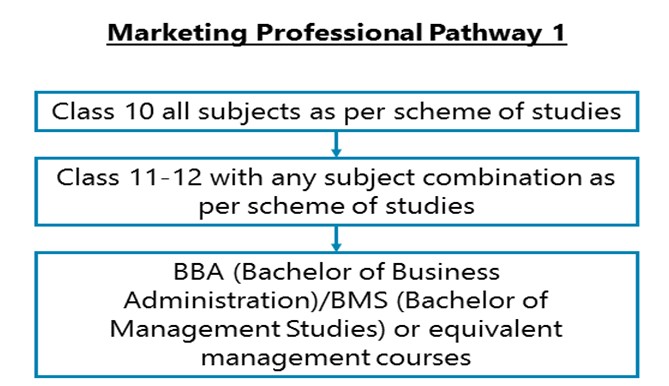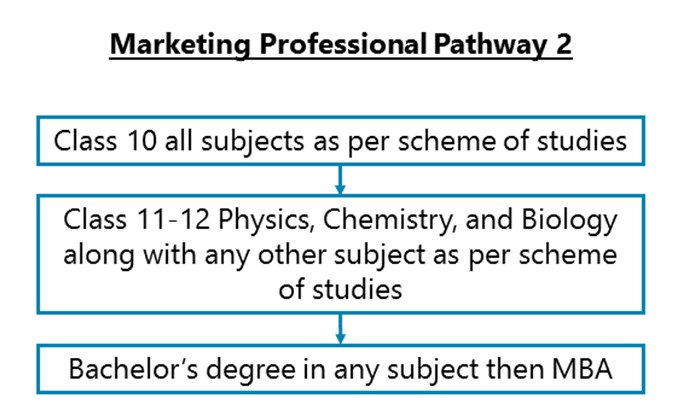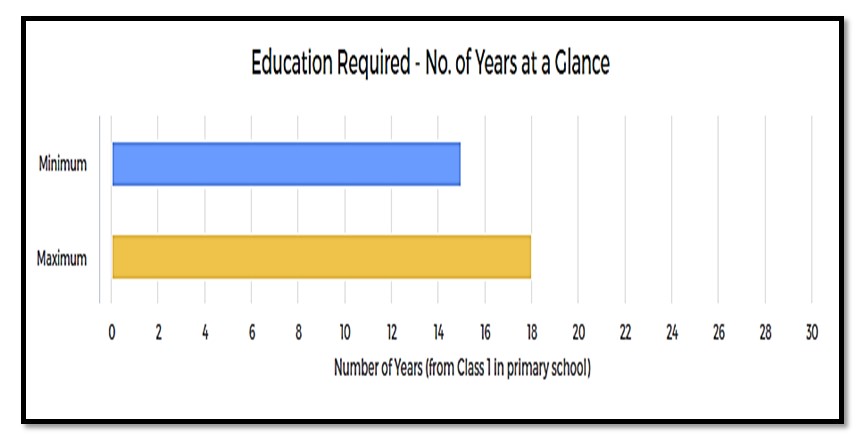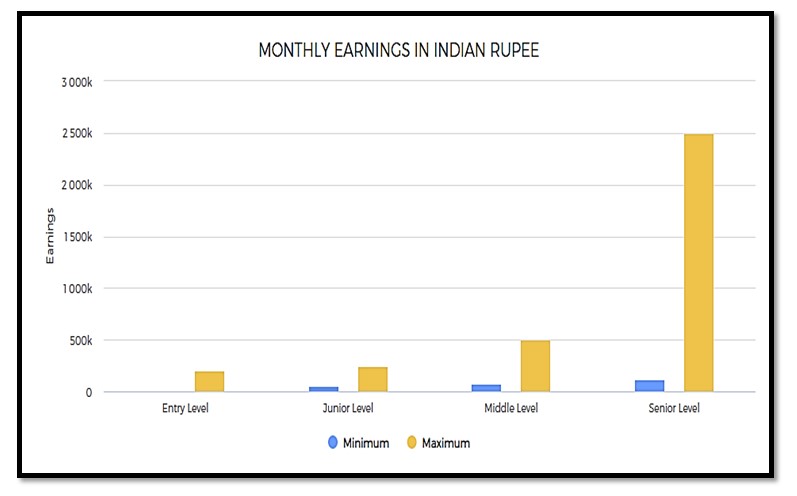Marketing Professional
Entry Level Qualification
Graduate
Career Fields
Business & Management
For Specially Abled






Career Entrance Exam
About Career
Marketing entails understanding the needs and demands of a group of consumers (often referred to as target market or target consumers) as well as developing, communicating, and delivering products or services to the target cossumers to fulfill their needs and demands. Marketing also entails fulfillment of the needs and demands of the target consumers in a way so as to make profits as well as make sure customer feedbacks are taken, customer complaints and grievances are resolved.
Marketing Professionals are essentially Managers/Executives who are responsible for creating, developing, planning and implementing strategices for marketing and promotion of various products and services of a company. As a Marketing Professional, your primary focus will be to retain existing customers and attract potential customers with actionable and compelling marketing strategies and plans. To be precise, you will be in charge of everything and anything that is associated with the marketing of a brand/company and its products or services.
PARTICULARS | DESCRIPTION |
Name | Marketing Professional |
Purpose | Develop Marketing Strategies/Campaigns |
Career Field | Business & Management |
Required Entrance Exam | No Entrance Exam |
Average Salary | 200000 - 400000 Rs. Per Year |
Companies For You | Ogilvy, BBDO, Leo Burnett, McCann & Many More |
Who is Eligible | Class 12th Pass |
Key Roles & Responsibilities
1. To conduct market research and analysis to identify potential customers; evaluate both past and latest trends; to understand the consumers’ pain points and demands; to evaluate the strong and weak points of competitors.
2. To plan and develop marketing strategies/campaigns to achieve specific marketing targets across different marketing channels and segments.
3. To lead the implementation and execution of marketing campaigns right from start to finish by collaborating with other teams (production/marketing/management/digital).
4. To work with in-house/external creative agencies to design marketing materials like brochures, flyers, advertisements, etc.
5. To develop appropriate business cases for marketing campaigns during the proposal stage and make the necessary changes to the existing marketing strategies accordingly.
6. To write and proofread marketing copy for online and offline campaigns for diverse marketing channels.
7. To make proactive marketing efforts through various channels while also handling and coordinating the social media and public relation efforts.
8. To reach out to and communicate with the target audience and build good customer relationships.
9. To support and supervise sales and lead generation efforts.
10. To conduct surveys to obtain customer feedback and analysis of the same.
11. To source and secure sponsorship for campaigns.
12. To plan and develop budgets after careful consideration of expenditures, R&D efforts, return-on-investment (ROI), and profit-loss projections.
13. To develop such pricing strategies that will maximize profits and market share without hampering customer satisfaction.
14. To organize and supervise advertising/marketing campaigns, exhibitions, seminars, conferences, and other promotional events to create brand awareness.
15. To monitor and track the progress of various campaigns using various metrics and develop and submit performance reports of the same.
16. To evaluate the impact of marketing campaigns to see if they were successful in achieving the target goals.
17. To build and maintain a professional relationship with vendors, media agencies, publishers, and other stakeholders for marketing purposes.
18. To maintain and update the product/service and customer database.
Career Entry Pathway
Class 10 all subjects as per scheme of studies - Class 11-12 with any subject combination as per scheme of studies - BBA (Bachelor of Business Administration)/BMS (Bachelor of Management Studies) or equivalent management courses.

After completing Class 11-12 with any subject combination as per scheme of studies. Then you can complete graduate with a Bachelor’s degree either in BBA (Bachelor of Business Administration) or BMS (Bachelor of Management Studies) or any other equivalent management courses.

After completing Class 11-12 with any subject combination as per scheme of studies. Then you can complete graduate with a Bachelor’s degree in any subject. Following this, you can obtain an MBA degree.
Required Qualification & Competencies
After your higher secondary or equivalent level of school studies, you can do an undergraduate degree in any subject or in Business Management/ Business Administration / Business Studies or in a similar subject. After your undergraduate degree, you can obtain a postgraduate degree or diploma in any of the following fields:
1. Business Administration with specialisation in Marketing/ Digital Marketing / Marketing Technologies & Automation / similar subject
2. Marketing Management
3. Marketing Technologies & Automation
4. Advertising and Brand Management
5. Digital Marketing
6. International Marketing Management
7. International Business and Foreign Trade
MINIMUM EDUCATION REQUIRED | MAXIMUM EDUCATION REQUIRED |
Under Graduate Undergraduate Degree / Honours Diploma / Graduate Diploma (equivalent to a Degree) Programs for which the minimum eligibility is a pass in Higher Secondary / Class XII School Leaving examination. | Post Graduate Postgraduate Degree / Diploma / Certificate Programs for which the minimum eligibility is a pass in Graduation / equivalent Diploma program like Honours Diploma or Graduate Diploma. |

Competencies Required
Interests
1. Enterprising: You should have interests for Enterprising Occupations. Enterprising occupations involve taking initiatives, initiating actions, and planning to achieve goals, often business goals. These involve gathering resources and leading people to get things done. These require decision making, risk taking and action orientation.
2. Conventional: You should have interests for Conventional Occupations. Conventional occupations involve repetitive and routine tasks as well as fixed processes or procedures for getting things done. These occupations involve working more with data, systems, and procedures and less with ideas or creativity.
3. Social: You should have interests for Social Occupations. Social occupations involve helping or assisting others; these involve working with and communicating with people to provide various services; these may involve educating and advising others.
Abilities
1. Abstract Reasoning: The ability to understand ideas which are not expressed in words or numbers; the ability to understand concepts which are not clearly expressed verbally or otherwise.
2. Articulation: The ability to speak clearly so others can understand you.
3. Deductive Reasoning: The ability to apply general rules and common logic to specific problems to produce answers that are logical and make sense. For example, understanding the reasons behind an event or a situation using general rules and common logic.
4. Emotional Intelligence: The ability to understand your own and others' emotions and feelings; empathy for others; adjusting your behaviour or self-control and self-regulation according to others' emptions and situations.
5. Fluency of Ideas: The ability to come up with a number of ideas about a topic (the number of ideas is important, not their quality, correctness, or creativity).
6. Inductive Reasoning: The ability to combine pieces of information from various sources, concepts, and theories to form general rules or conclusions. For example, analysing various events or situations to come out with a set of rules or conclusions.
7. Inter-Personal: The ability to build and maintain good relationships with others at workplaces and elsewhere.
8. Intrapersonal: The ability to clearly understand your strengths and weaknesses, what your capabilities are, what you can do and cannot do, what you like and dislike.
9. Numerical Reasoning: The ability to add, subtract, multiply, divide, and perform other basic numerical calculations correctly.
10. Oral Comprehension: The ability to listen to and understand information and ideas presented through spoken words and sentences.
11. Oral Expression: The ability to communicate information and ideas in speaking so others will understand.
12. Originality: The ability to come up with unusual or innovative ideas about a given topic or situation, or to develop creative ways to solve a problem.
13. Problem Sensitivity: The ability to tell when something is wrong or is likely to go wrong. It does not involve solving the problem, only recognizing there is a problem.
14. Selective Attention: The ability to concentrate on a task over a long period of time without being distracted.
15. Speed of Closure: The ability to quickly make sense of, combine, and organize information into meaningful patterns.
18. Verbal Reasoning: The ability to think and reason with words; the ability to reason out ideas expressed in words.
17. Written Comprehension: The ability to read and understand information and ideas presented in writing.
18. Written Expression: The ability to communicate information and ideas in writing so others will understand.
Knowledge
1. Administration: Knowledge of various administrative and operational functions in managing a business or an organisation such as general administration, facility management, front office management, back office management, etc.
2. Business Management: Knowledge of managing a business which involves planning of what to do, organising resources and people, leading and supervising work activities of people, and monitoring performances of people as well as performance of business. This includes knowledge of marketing, finance, human resources management, operations management, etc.
3. Customer Service: Knowledge about how to provide customer services. This includes understanding customer needs, helping customers to use products and services, answering customer queries, handling customer complaints and grievances, and evaluating customer satisfaction.
4. Marketing: Knowledge of the various principles, theories, methods, systems and processes to understand the needs of a category of customers and then creating, communicating, and delivering various products and services in order to satisfy the needs of the customers.
5. Sales and Promotion: Knowledge of the various principles, theories, methods, systems and processes to communicate and promote the benefits of various products or services of an organisation to a targeted group of customers, influencing their buying decisions and convincing them to buy the products or services.
Skills
1. Active Learning: Focused and continuous learning from various sources of information, observation and otherwise for application in getting work done.
2. Active Listening: Giving full attention to what other people are saying, understanding the points being made by others, asking questions, etc.
3. Communication in English: Skills in communicating effectively in writing as well as verbally with others in English language.
4. Coordination: Skills in working together with other people to get things done.
5. Critical Thinking: Skills in analysis of complex situations, using of logic and reasoning to understand the situations and take appropriate actions or make interpretations and inferences.
6. Directing: Skills in directing others' actions to get things done.
7. Instruction: Skills in training others how to do something.
8. Judgment and Decision Making: Skills in considering pros and cons of various decision alternatives; considering costs and benefits; taking appropriate and suitable decisions.
9. Managing Human Resources: Skills in motivating, developing, and leading people as they work, identifying the best people for the job.
10. Negotiation: Skills in bringing others together and trying to reconcile differences.
11. Persuasion: Skills in persuading others to change their minds or behaviour.
12. Problem Solving: Skills in analysis and understanding of problems, evaluating various options to solve the problems and using the best option to solve the problems.
13. Reading Comprehension: Skills in understanding written sentences and paragraphs in work related documents.
14. Selling: Skills in promoting and canvassing about various products and services to prospective customers; influencing their decisions to buy the products and services; and making sure that they get the delivery of the products and services.
15. Service Orientation: Skills in or keen interest to help and assist people.
16. Supervising: Skills in Supervising and monitoring performance of others, businesses, and different projects.
17. Time Management: Skills in prioritizing work, managing time effectively.
18. Writing: Skills in communicating effectively in writing as appropriate for the needs of the readers.
Personality
1. You are always or mostly organised in your day-to-day life and activities.
2. You always feel secure in your surroundings and in most situations.
3. You are always self-satisfied or feel satisfied with your life in most situations.
4. You are a soft-hearted person sometimes.
5. You trust others sometimes but not always.
6. You are helpful to others sometimes.
7. You remain calm in difficult situations sometimes but some other times you are anxious.
8. You are imaginative sometimes.
9. You prefer to experience new things and have new experiences sometimes.
10. You act independently sometimes but do not do so in some other times.
11. You are friendly and outgoing sometimes, but not always. You prefer company of people sometimes but not always.
12. You are caring, supportive, sympathetic and kind to others sometimes.
Career - Job Opportunities & Profiles
You can begin your career as an Executive/Sales Trainee or Management Trainee in:
1. The marketing/sales management department of any company or firm in any industry
2. Marketing/management consulting firms
3. Advertising agencies
Work environment
Typically, Marketing Professionals work in corporate environments as a part of a larger marketing, creative, or communications team. They usually have a 9-5 job and work around 9-10 hours every day. However, since their work often has strict deadlines, they may have to work extra hours to ensure that the required targets are met. While most of the work can be completed within an office setting, Marketing Professionals may be required to travel from time to time. They may have to travel to distant locations to meet with business associates or clients, and with prospective media agencies (production companies, print production companies, etc.).
Specialisation Tracks In This Career
1. Brand Manager
A brand is a unique identity for a product or a service which different it from other similar products or services. As customers, we buy various generic products like vegetables, rice, pulses, etc. and we also buy various branded products like a Pepsodent toothpaste, a Samsung mobile phone, Ashirwad atta, Tata Salt, and so on. We consume branded services such as services from a particular bank we prefer, a preferred insurance company and so on. Brand Managers create and develop such unique identities around generic products and services. They communicate (by advertising and promotion) about the unique identity to potential customers and influence them to buy.
2. Product Manager
Product Managers are responsible for the development of products for an organization by researching, developing, and implementing methods that reduce the operational costs and enhance the quality of the products/services for optimum customer satisfaction. They determine and plan the business strategy behind a product, define its functions and features, and organize and oversee the product launch process all the way through. Product Managers are highly organized leaders who offer their expertise to an organization in taking strategic product decisions.
3. Marketing Communications Manager
Marketing Communications Managers are expert storytellers - they know what kind of communication and advertising in which media will attract the attention of the target audience. They coordinate and oversee the advertising, communications, digital marketing, and public relations activities. Marketing Communications Managers not only create and implement plans to increase market share but they are also adept at developing cost-effective ways of marketing products/services.
4. Digital Marketing Manager
Digital Marketing Managers are expert professionals in the digital space. They focus on developing, implementing and managing digital marketing campaigns to promote brands and their products/services. They use their digital marketing expertise to create leads and boost website traffic. They also use a host of Web analytics tools to optimize marketing campaigns, search advertising, content and email marketing, and so on.
5. International Marketing Manager
International Marketing Managers are responsible for maximizing a company/firm’s global market share and profits. They have to continually stay updated with global market trends and developing products accordingly that meet both international standards and demands. Also, International Marketing Managers determine and establish competitive and profitable pricing strategies that can help a brand compete with global competitors.
Career Growth
1. If you start your career as an Executive/Sales Trainee in any company, your next step of promotion would be to the position of Area Sales Manager. Then you will be promoted to Regional Sales Manager. After this, you will transition from the field of sales to marketing/management as a Product Manager. Further, you will be promoted to Marketing Manager and then to Senior Marketing Manager. Finally, you will become the Associate Vice President, and then the Vice President.
2. As a Management Trainee with a minimum of two years of work experience in sales, your next step of promotion would be to the position of the Product Manager. After this, you will upgrade to the level of Marketing Manager and then to Senior Marketing Manager. Later, you will be promoted to Associate Vice President, and then to Vice President. Your final promotion would be to the position of the Chief Marketing Officer.
3. In a Management / Marketing Consulting firm, you will move from an Associate to a Senior Associate’s role. After that, you will become a Consultant in the junior most level and then get promoted to the role of a Senior Consultant then to the role of a Lead or Principal Consultant.
4. In an advertising agency, you will join as a Trainee in the Client Servicing department. Once you spend 5-10 years in client servicing, you may become an Account Director or become a Senior Manager/Director with the Account Planning and Brand Management department. You can grow very fast in advertising, and within ten years you can be a VP.
Salary Offered
1. When you join a company/firm as an Executive/Sales Trainee after your graduation, you will earn Rs. 15,000 - 25,000 per month.
2. After completing your MBA, you can become a Management Trainee, and your starting salary could range anywhere between Rs. 40,000 - 2,00,000. High-end salaries are paid to graduates hailing from premier Business Schools.

Monthly Earnings In Indian Rupee
Entry Level | Junior Level | Mid Level | Senior Level | ||||
Min Earning | Max Earning | Min Earning | Max Earning | Min Earning | Max Earning | Min Earning | Max Earning |
15000 | 200000 | 50000 | 250000 | 70000 | 500000 | 120000 | 2500000 |
1. Entry level: 0 - 2 years of work experience
2. Junior Level: From 1 to 12 years of work experience
3. Mid Level: From 5 to 20+ years of work experience
4. Senior Level: From 10 to 25+ years of work experience (there could be exceptions in some high-end technical, financial, engineering, creative, management, sports, and other careers; also in the near future, people will reach these levels much faster in many careers and in some careers, these levels will have no meaning as those careers will be completely tech skill driven such as even now, there is almost no level in a Cyber Security Expert’s job)
Work Activities
1. Addressing grievances and resolving conflicts: Handling complaints and grievance to resolve; resolving conflicts among co-workers or others at workplace or outside in relation to your work.
2. Analysing and interpreting data and information: Analysis of data and information to find facts, trends, reasons behind situations, etc.; interpretation of data to aid in decision making.
3. Coaching and developing: Identifying training and professional development needs of others; coaching and training them to develop skills to perform tasks and improve performance.
4. Communicating with co-workers and others: Communicating with people in writing, verbally or otherwise inside your workplace and various other people who have professional relationships with your place of work including vendors, government officials, etc. or with people at large.
5. Communicating with customers: Communicating with potential and existing customers of your organisation in writing, verbally or otherwise.
6. Creative thinking: Developing new ideas, concepts, innovative solutions to problems, newer ways of getting things done, designing products and services, creating work of art and craft, etc.
7. Decision making and problem solving: Analysis of data and information; evaluation of alternative decisions and results of decisions; taking the right decisions and solving problems.
8. Developing and maintaining inter-personal relationships: Developing professional relationships with co-workers and others outside organisations and maintaining good relationships.
9. Estimating quantity, cost, time and resources: Estimating sizes, volumes, distance, and quantity; estimating and determining time, costs, and resources; estimating materials required to perform a task.
10. Getting Information and learning: Observing, hearing, reading, using computers, or otherwise obtaining information and learning from it.
11. Handling administrative activities: Handling various administrative tasks and managing day-to-day operations.
12. Inspecting situations, events, and people: Inspecting situations, events and people to understand the reasons and causes for the situation or events to happen; inspecting people to understand reasons behind their behaviour and actions.
13. Leading: Inspiring and motivating co-workers to work to achieve specific goals; enabling and facilitating others to perform tasks effectively; addressing issues and solving problems in order to help people perform well.
14. Managing and supervising: Manging and supervising work of others; setting goals; giving instructions; monitoring work performance, etc.
15. Negotiating: Negotiating terms, conditions, costs, prices and about other issues.
16. Organising, planning and prioritising tasks: Planning and organising tasks in order to achieve work goals; prioritising tasks to achieve goals and making the best use of the time available.
17. Providing advices and consultation to others: Giving advices or consultation to others about various issues, conceptual matters, know-hows, scientific matters, products or services.
18. Recruiting, enlisting and placing people resources: Sourcing, recruiting, selecting, enlisting and placing people in different positions and tasks in an organisation or for getting work done.
19. Scheduling tasks: Scheduling project timelines, tasks and activities.
20. Selling: Communicating about products and services with potential customers; influencing customers' decisions to buy products and services; helping people to buy products and services.
21. Strategic planning: Developing visions and goals, developing strategies and action plans for achieving visions and goals.
22. Updating and using relevant knowledge: Keeping updated with the latest knowledge relevant to your fields of work and use of the relevant knowledge in getting things done.
23. Using computers for work: Using computers for day-to-day office work; using computer software for various applications in day-to-day professional work; entering data and process information; for writing.
24. Working in a team: Working in a team of people; developing team; maintaining professional relationships among team members.
Future Prospects
Marketing is one of the core components of the business world. According to the U.S. Bureau of Labor Statistics (BLS), by 2026, the number of jobs for Marketing Managers is expected to increase by 10% in the US. Also, the BLS estimates that by 2026, the demand for Marketing Research Analysts will increase by 23%. In India, too, business opportunities are rising as more and more global companies are investing in the Indian business sector. Thanks to globalization, FDI (foreign direct investment) scaling rapidly in India, and consequently the demand for skilled Marketing Professionals is increasing.

Future Prospects At A Glance
Current (0-1 year) | Long Term (2-5 year) | Very Long Term (6-10 years) |
Slow Growth | Moderate Growth | Moderate Growth |


